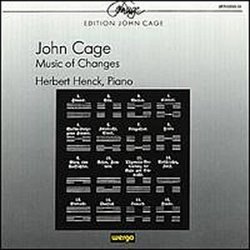| All Artists: Cage, Henck Title: Music of Changes, Books 1-4 Members Wishing: 3 Total Copies: 0 Label: Wergo Germany Release Date: 12/8/1993 Genres: Dance & Electronic, Jazz, Classical Styles: Techno, Forms & Genres, Short Forms, Historical Periods, Modern, 20th, & 21st Century, Instruments, Keyboard Number of Discs: 1 SwapaCD Credits: 1 UPCs: 093046272722, 4010228609929 |
Search - Cage, Henck :: Music of Changes, Books 1-4
 | Cage, Henck Music of Changes, Books 1-4 Genres: Dance & Electronic, Jazz, Classical
|
Larger Image |
CD Details |
CD ReviewsGreat complexity and fresh conceptual air,a piano classic Rachel Abbinanti (tusai1@aol.com) | Chicago | 06/11/1999 (5 out of 5 stars) "We hardly notice it now,but in the early Fifties, the time of the soaringly high avant-garde, experimentation and the search for new musical languages, John Cage was still considered a breath of fresh air in Europe. Stockkhausen and Boulez,and Berio were serious people,their music inhabited a severe world,one of deterministic configurations,elaborate premeditated compositional plans and extremes of virtuosity in their music diving into all the registers of the piano. Cage brought a conceptual freedom to this mileau with various compositional processes he found naturally as a means of eradicating the aesthetic object, at least one that is predictable. Like graphic notation, and works not having a beginning,middle or end, at least not in that order. But complexity of means was an intense fascination for this post-war generation, but without having a vision that perhaps they were ignoring the larger emotive frame relative to the history of music.Theodor Adorno had takened issue with these youngsters, that for all the vigours experimentation,the musical content remained backward looking. Cage's "Music of Changes" was the one of his first to extensivily utilize chance procedures,something he was beginning to learn from the Chinese book of proverbs the I Ching. This is quite an extensive work, Four Books, each of which can be played as a self-contained performance. And the piano is exploited in all its registers,with silences,and a simplicity as well as a complexity. Cage continued to be fascinated by the pure beauty of single exposed tones,a bare fifth, or single strident sevenths in the high stratospheres of the piano. Funny how Cage's use of tones is very folksy, there are moments where tonal configurations of the pitches are heard,but of course jettisoned from their context of functional tonality, these tones become something else. Henck has made a reputation for himself playing all the ferociously difficult repertiore, as Ian Pace,Massimilio Damierini,Pierre Aimard have done today. Henck brings a passivity, as if he is merely a conduit for these coldly abstract sonic structures."
|

 Track Listings (4) - Disc #1
Track Listings (4) - Disc #1